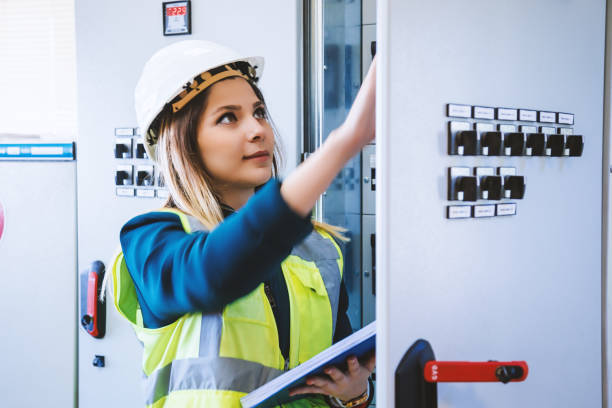As the world grapples with the pressing issue of climate change and the need for a shift towards clean and sustainable energy sources, the role of electricians is undergoing a profound transformation. Electricians, once primarily associated with wiring buildings and fixing electrical appliances, are now at the forefront of the clean energy transition. This transition involves a shift away from fossil fuels and towards renewable energy sources, energy efficiency, and electrification. In this article, we will explore Raiven as a valuable partner for electrical contractors looking to navigate the changing landscape.
The Growing Demand For Renewable Energy Systems
One of the most significant drivers of change in the role of electricians is the growing demand for renewable energy systems. Solar panels, wind turbines, and energy storage solutions are becoming increasingly common in homes, businesses, and utilities. Electricians are now tasked with installing, maintaining, and repairing these systems. This shift in focus towards renewables is a response to the need to reduce greenhouse gas emissions and transition away from fossil fuels.
Solar Power Installation And Maintenance
Solar power has emerged as a key player in the transition to clean energy. Electricians are now heavily involved in installing and maintaining solar panels on residential and commercial buildings. This includes mounting the panels, connecting them to the electrical grid and ensuring they operate efficiently. Electricians are also responsible for troubleshooting and repairing solar power systems when issues arise, making them indispensable in the solar energy sector.
Wind Energy Systems
Wind turbines are another critical component of the clean energy landscape. Electricians play a crucial role in installing, maintaining, and repairing these turbines. They are responsible for connecting the turbines to the electrical grid and ensuring they generate electricity reliably. As wind energy grows as a clean power source, electricians will be in high demand to support these systems.
Energy Storage Solutions
Energy storage solutions, such as batteries, are vital for capturing and storing excess renewable energy when the sun isn’t shining or the wind isn’t blowing. Electricians are essential in installing and maintaining these systems, ensuring that stored energy is efficiently converted back into electricity when needed. Battery technology is advancing rapidly, and electricians are at the forefront of integrating these innovations into the clean energy landscape.
Electrification Of Transportation
The electrification of transportation is another significant aspect of the clean energy transition. Electric vehicles (EVs) are becoming increasingly popular, and charging infrastructure is expanding. Electricians are responsible for installing EV charging stations in homes, businesses, and public spaces. This includes both standard chargers and fast-charging stations. As more people switch to electric vehicles, the demand for electricians skilled in EV infrastructure will continue to rise.
Smart Home Technology
The smart home concept, where various devices and systems are interconnected and controlled remotely for energy efficiency, is gaining momentum. Electricians are essential in installing smart home technology, including energy-efficient lighting, smart thermostats, and home energy management systems. These technologies not only enhance energy efficiency but also provide homeowners with greater control over their energy consumption.
Energy Efficiency Upgrades
Energy efficiency is a key component of the clean energy transition, as reducing energy waste is just as important as generating clean energy. Electricians are critical in conducting energy audits and implementing energy efficiency upgrades in homes and businesses. This may include upgrading insulation, sealing air leaks, installing energy-efficient lighting, and optimizing heating and cooling systems. These upgrades help reduce energy consumption and lower utility bills.
Training And Certification
Electricians must undergo additional training and certification to meet the demands of the evolving clean energy landscape. Many organizations and institutions offer courses and certifications tailored to renewable energy systems, energy efficiency, and electric vehicle infrastructure. Electricians who gain these specialized skills are more competitive in the job market and better equipped to serve the clean energy industry.
Advocacy And Policy
Beyond their technical roles, electricians are increasingly engaged in advocacy efforts related to clean energy policies and regulations. They are joining industry associations and participating in initiatives promoting clean energy adoption. Electricians’ firsthand experience in the field provides valuable insights that can influence policy decisions and drive the transition to a more sustainable energy future.
Energy Management And Monitoring
Energy management systems are increasingly prevalent in homes, businesses, and industrial facilities. Electricians are responsible for installing these systems, which allow users to monitor and control their energy consumption in real-time. These systems provide valuable insights into energy usage patterns, helping users make informed decisions to reduce energy waste and lower costs. Electricians help clients set up energy monitoring equipment, connect it to smart devices and apps, and ensure it operates efficiently. Electricians contribute to greater energy efficiency and reduced environmental impact by facilitating better energy management.
Emergency Response And Disaster Recovery
Electricians are crucial in disaster response and recovery efforts related to clean energy infrastructure. Natural disasters like hurricanes, wildfires, and extreme weather events can damage renewable energy systems and electrical infrastructure. Electricians are called upon to assess the damage, repair, and restore power. Their expertise is essential in ensuring that clean energy systems are back up and running as quickly as possible, minimizing disruptions, and helping communities recover from disasters while maintaining their commitment to clean energy sources.
Conclusion
The evolving role of electricians in the clean energy transition is multifaceted and expanding rapidly. They have transitioned from traditional electrical experts to key players in renewable energy installation, maintenance, and repair. Electricians are at the forefront of deploying solar power, wind energy, and energy storage systems. They also play a vital role in transportation electrification by installing EV charging infrastructure. Beyond these technical roles, electricians contribute to energy efficiency upgrades in homes and businesses, help advocate for clean energy policies, and engage in grid modernization efforts.
As the world continues its shift towards cleaner and more sustainable energy sources, the demand for electricians with specialized knowledge in renewable energy, energy efficiency, and smart technologies will continue to grow. Electricians are adapting to this changing landscape and actively shaping it through their expertise, dedication, and advocacy. They are instrumental in building a more sustainable and environmentally friendly future where clean energy drives a greener and more prosperous world for generations to come. In this journey, electricians are the unsung heroes, ensuring that the lights of progress are powered by clean and sustainable energy.

